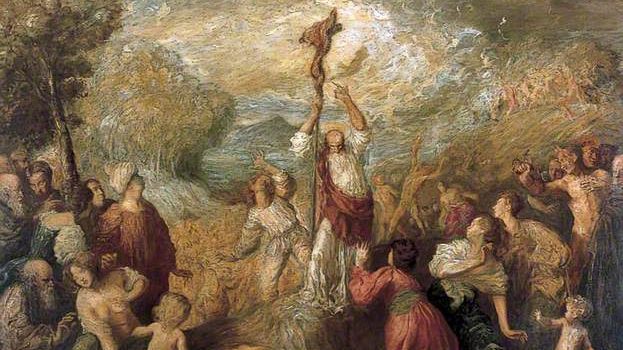Liturgy: “Their bodies filled with poison—were as good as dead”
We’re more into “empowerment,” and “taking control of our lives” or of our “destiny.” Who needs grace? Who needs God?

What is the King’s Liturgy? King’s Liturgy defines our experience together as a Christian community. It outlines the rhythms we celebrate with the Church at large: Scripture readings, Sabbath habits, and celebration of Holy Days and historical events.
This Week’s Lectionary Readings
Numbers 21:4-9
Ephesians 2:1-10
John 3:14-21
Psalm 107:1-3, 17-22
This week’s liturgy is contributed by Dr. David Innes, chair of the politics, philosophy, and economics program, associate professor of politics:
“There but for the grace of God go I.” That was once a common phrase. But people aren’t into grace like they once were. And they’re not that into God either. We’re more into “empowerment,” and “taking control of our lives” or of our “destiny.” Or just controlling our world through apps and staying connected and controlling ourselves through healthy lifestyle and positive attitude. Who needs grace? Who needs God?
After God freed Israel from bondage in Egypt, they looked at their resources and their capacities and said, “Why have you brought us up out of Egypt to die in the wilderness? For there is no food and no water, and we loathe this worthless food” (Num. 21:5). They had the Lord, and having him they had everything. Without him, they had nothing. But they saw only human capacity and so they complained. For this reason, God humbled them with biting serpents for which their only—graciously provided—remedy was simply to look at the bronze serpent and live.
Just as those people—alone in the desert, their bodies filled with poison—were as good as dead, so too we—though we jog and sing and eat and read—are “dead in our trespasses and sins” (Eph. 2:1, 5). On our own, we have no options. That is the force of those startling words: “But God.” Our Savior God graciously intervenes as our only hope. “But God… made us alive together with Christ—by grace you have been saved” (Eph. 2:4-5). Whether you are a helpless baby or Dwayne Johnson, if you are falling from a plane to the ground, you have no options and only one certainty: death. “There but for the grace of God go I.”
This grace works through faith – personal, active faith. “For by grace you have been saved through faith” (Eph. 2:8). That faith centers on the Lord Jesus, crucified, risen, and exalted. “And as Moses lifted up the serpent in the wilderness, so must the Son of Man be lifted up, that whoever believes in him may have eternal life” (John 3:14f.). That is not a condition for receiving God’s grace. It’s not your contribution. It is a despair of contributions, simply receiving God’s unconditional love in Christ.
And so, in all things, from the food on our table to our rest in glory, we “give thanks to the Lord, for he is good, for his steadfast love endures forever!” (Psalm 107:1).




